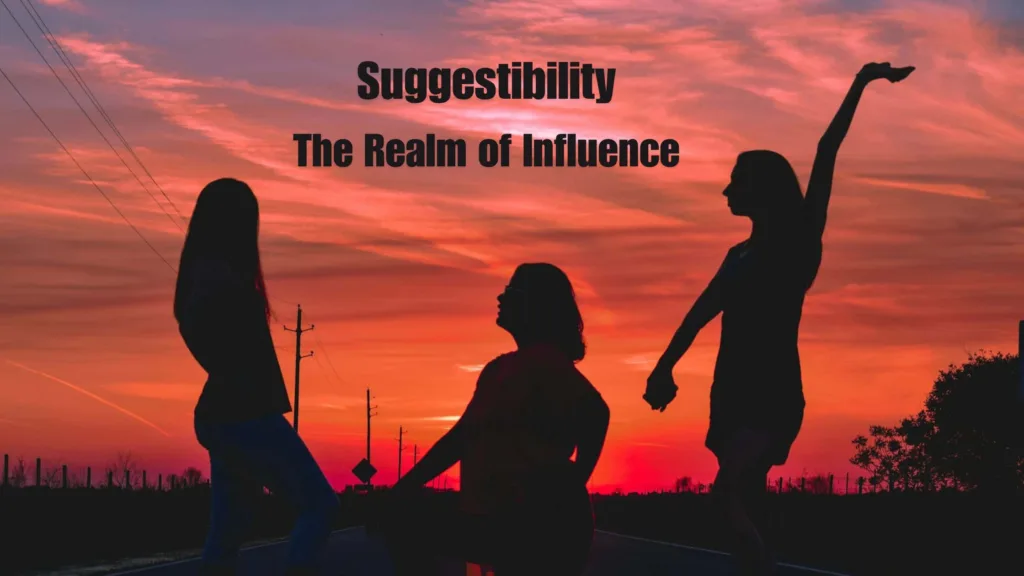Suggestibility Psychology is all about how things outside of us can change what we think, believe, and do. It looks at how suggestions affect us in different situations, like when we’re talking to someone or getting help from therapy. This article will explain suggestibility psychology in simple terms, talking about how it works, where we see it in real life, and what it means for people and communities.
What is Suggestibility Psychology?
Suggestibility is when we tend to believe and do what others suggest to us, without really thinking it through or questioning it. It’s something we all do sometimes. Like, if a friend suggests going to a certain restaurant, we might agree without considering other options. This happens because our brains are wired to trust and follow what others say, especially in certain situations or depending on our personalities and who we’re with. So, suggestibility can vary from person to person and situation to situation. For instance, someone might be more likely to agree with a suggestion from their boss at work, while they might question suggestions from a stranger.
Reasons Behind
- We Trust People: We tend to believe and follow what others suggest, especially if we trust them or want to be liked by them.
- Experts and Authority: We listen to people who seem like they know what they’re talking about or have authority, like teachers or doctors.
- We Have Biases: Sometimes, our brains take shortcuts and believe things that fit with what we already think. For example, if we like a brand, we might believe their ads more.
- It Depends on the Situation: Sometimes, we’re more likely to go along with suggestions because of the situation we’re in, like if we’re in a hurry or feeling unsure.

Real-World Applications of Suggestibility Psychology
Here are the real-world uses of suggestibility psychology in simpler terms:
- Advertising and Marketing: Companies use tricks to make us want to buy their stuff. They create ads and use famous people to convince us to buy things.
- Law Enforcement and Interrogation: In the law world, suggestibility is important. Cops need to ask questions carefully so they don’t accidentally make people say things that aren’t true.
- Therapy and Counseling: Therapists use suggestibility to help people feel better. They might use techniques like hypnosis or talking therapy to help patients change their behavior and feel happier.
- Education and Learning: Teachers can use suggestibility to help students learn better. By presenting information in fun and interesting ways, they can help students remember things more easily.
- Social Influence and Relationships: Knowing about suggestibility can help us understand how we’re influenced by others. This can make our interactions with friends and family better.
- Public Policy and Governance: Leaders use suggestibility to make people do things that are good for everyone. For example, they might use persuasive messages to encourage people to recycle or vote.
Moral Concerns
While suggestibility can be used to help people, like in therapy or marketing, it can also be a problem. Sometimes, it might feel like someone is trying to control or trick us (Ambiguity Fallacy: Avoid the Trap of Ambiguity) into doing something we don’t want to do. This raises ethical concerns, which means questions about what’s right and wrong. People who work in fields like psychology and marketing need to be careful. They have to make sure they’re not manipulating or forcing people to do things they don’t want to do. They need to respect people’s choices and make sure they agree to what’s being suggested. It’s like walking a tightrope – trying to help without crossing the line into doing something wrong.
Suggestibility Psychology teaches us a lot about how our minds work and why we do certain things. By learning about how suggestions affect us, we can understand why we make certain choices. This knowledge helps us deal with outside influences on our thoughts and actions. Also, knowing about suggestibility can help us think more carefully about information and make smarter decisions, especially in a world with lots of different messages coming at us. As scientists keep studying suggestibility, we’ll keep learning more about how it affects both individuals and society.

Pingback: Contextual Interference: Learning in the Chaos of Context
Pingback: Outgroup Homogeneity: Beyond the Stereotype
Pingback: Goal-Directed Behavior: The Blueprint to Success